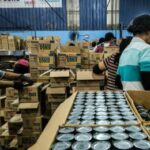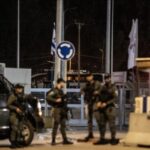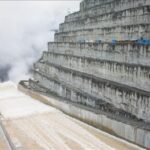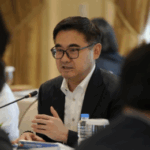MANILA – At the stroke of midnight on New Year’s Day, it’s game over for Philippine offshore gaming operators (POGOs) which became a bane to society over its links to a string of criminal activities.
Pursuant to Executive Order (EO) 74 signed by President Ferdinand R. Marcos Jr. in November, Philippine law enforcement agencies launched a crackdown against POGOs to ensure that they cease operations before the end of 2024.
This resulted in the closure of the country’s biggest POGO compound located at the former Island Cove resort in the province of Cavite on Dec. 17, led by Interior Secretary Jonvic Remulla, Presidential Anti-Organized Crime Commission (PAOCC) Executive Director Undersecretary Gilbert Cruz, Philippine Amusement and Gaming Corp. (PAGCOR) chairperson Alejandro Tengco and Philippine National Police (PNP) chief Gen. Rommel Francisco Marbil.
The Remulla family sold the resort to a real estate developer in 2017. The facility then started operations as a POGO hub in 2019.
The POGO facility on the 33-hectare property is the biggest in the country with 30,000 employees, half of whom were Filipinos.
The compound consists of 57 buildings, including employee dormitories, gaming hubs, cafés, groceries, clinics, restaurants, spas and beauty salons.
Meanwhile, the PAOCC is intensifying the campaign against guerrilla POGO operations throughout the country.
Law enforcers would also mount inspections of special class business process outsourcing (BPO) facilities to ensure that no POGO hubs are concealing operations.
Guo, Quiboloy fall
The year 2024 also saw the downfall of two high-profile individuals linked to a string of crimes — dismissed Bamban, Tarlac Mayor Alice Guo and Kingdom of Jesus Christ (KOJC) leader Apollo Quiboloy.
Guo was deported to the country after being arrested in Indonesia in September.
The dismissed mayor, her siblings Wesley and Shiela, and their parents were earlier ordered arrested by the Senate for their refusal to appear in its investigation into the operations of the Zun Yuan Technology Inc., the Philippine Offshore Gaming Operators (POGO) hub in Bamban which was raided by authorities in March.
The investigation also led to questions on the nationality of the dismissed mayor, after the Philippine authorities revealed that her fingerprints matched that of a certain Chinese national identified as Guo Hua Ping.
In an Aug. 12 order, the Ombudsman dismissed Guo from the service for grave misconduct and perpetually banned her from holding public office.
This was in connection with the charges filed by the DILG against Guo for her alleged involvement in the operations of POGO.
Guo and her co-accused face charges of qualified human trafficking in connection with a June raid on a POGO hub in Bamban, Tarlac, where 800 Filipino and foreign workers were rescued.
In September, non-bailable criminal charges for qualified trafficking were filed before the Pasig Regional Trial Court (RTC) against dismissed Guo and 13 others.
Aside from Guo, the DOJ also charged Dennis Cunanan and 12 other executives and founders of three companies, who are allegedly Guo’s business partners.
Meanwhile, Quiboloy was arrested on Sept. 8 at the KOJC compound in Davao City after more than two weeks of operation.
Quiboloy is currently facing a non-bailable qualified human trafficking charge. He is also accused of child and sexual abuse, along with five of his aides.
Following the arrest, his lawyers immediately sought a hospital or house arrest due to his medical history, including two previous heart-related procedures.
The court denied the petition after the Philippine National Police General Hospital declared that his condition is not life-threatening.
Last November, Quiboloy was transferred to the Pasig City Jail from the Philippine Heart Center where he is confined after being granted a medical furlough.
Bloodless anti-drug drive gains
The Marcos administration’s anti-drug campaign has so far netted PHP51.14 billion worth of narcotics and arrested 119,022 drug suspects for the period of July 2022 to Oct. 31 this year, the Philippine Drug Enforcement Agency (PDEA) reported.
Records also showed that among those arrested were 7,567 high-value targets in 87,802 operations across the country.
A total of 1,217 drug dens and 2 clandestine shabu laboratories were dismantled during the same period.
Meanwhile, 29,211 out of 42,000 villages have been declared "drug-cleared" while 6,292 are in the process of being cleared.
During his third State of the Nation Address in July, President Ferdinand R. Marcos Jr. pledged to continue the bloodless anti-narcotics drive, emphasizing that extermination is not a part of his administration’s anti-drug campaign.
Meanwhile, the PNP Drug Enforcement Group (PDEG) seized nearly PHP2.4 billion worth of narcotics from Jan. 1 to Dec. 18, 2024.
PDEG chief Brig. Gen. Eleazar Matta said the amount includes 168 kg. of shabu, 3,866,600 fully grown marijuana plants, 1,830 kg. of dried marijuana leaves, 48.672 kg. of ketamine, 36.9 kg. of kush, 1,343 tablets of ecstasy and 90 grams of cocaine.
The illegal drugs were seized in 698 operations, including buy-busts, service of search warrants, and marijuana eradication drive which also led to the arrest of 809 drug suspects and 232 wanted persons.
Matta said efforts now focus on interdiction and that the PDEG remains proactive in executing coordinated, high-impact operations and ensuring integrity and transparency in all operations, consistently using body-worn cameras.
He said actions are documented, with airtight cases prepared to ensure the prosecution of offenders.
Matta also paid tribute to police operatives who died in the line of duty.
“The heroism of these operatives inspires the entire force to press on, ensuring that their sacrifices were not in vain,” Matta said.
He noted this milestone achievement underscores the PNP’s recalibrated Anti-Illegal Drug Campaign Roadmap 2024–2028 which embodies a human-rights-focused and community-driven approach to tackling the nation’s drug problem. (PNA)






